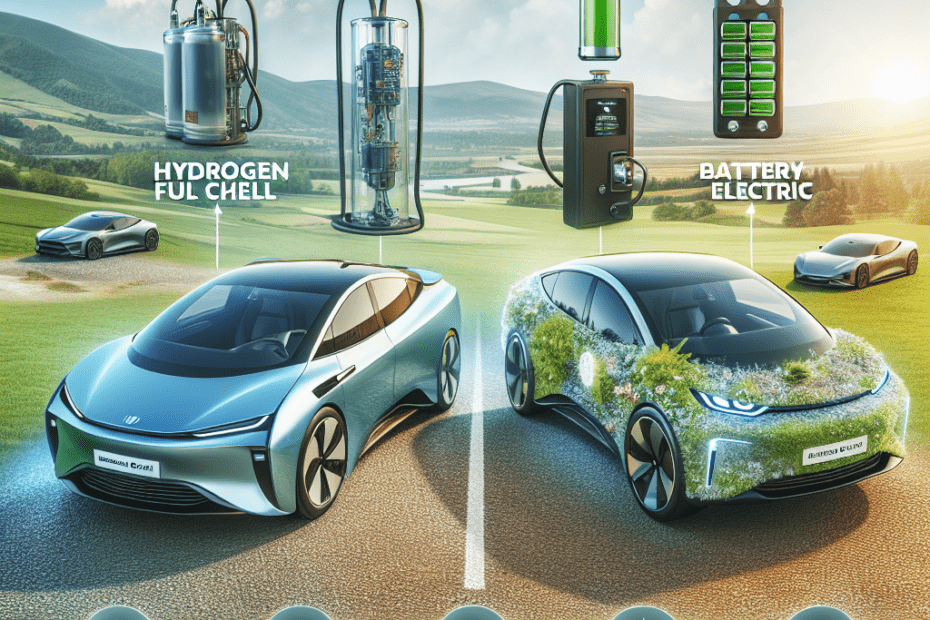“`html
Hydrogen Fuel Cell vs. Battery Electric: The Future of Green Vehicles
As environmental concerns grow, individuals seek new solutions to cut carbon emissions and transition to alternative fuel vehicles. Among the frontrunners in this green revolution are hydrogen fuel cell vehicles (FCVs) and battery electric vehicles (BEVs). Both options promise to reduce reliance on traditional fossil fuels and diminish pollution. But which technology truly represents the future of eco-friendly transportation?
Understanding Hydrogen Fuel Cell Vehicles
Hydrogen fuel cell vehicles use a fuel cell to produce electricity. This process involves combining hydrogen stored on the vehicle with oxygen from the air, generating electricity and releasing only water vapor as a byproduct. According to a report from the U.S. Department of Energy, a fuel cell vehicle can travel between 300 to 400 miles on a single tank and refuel in just about five minutes, offering some advantages over traditional battery electric vehicles in terms of refueling time and range.
Benefits and Challenges of Hydrogen Fuel Cells
- Advantages: Fast refueling time, longer range, fewer emissions.
- Challenges: High cost of hydrogen production, limited refueling infrastructure, storage issues.
The high cost and current lack of infrastructure for hydrogen refueling stations are hurdles that need to be overcome for hydrogen FCVs to become mainstream. However, they have the potential to dominate markets like long-haul transportation and industries needing rapid refueling.
Exploring Battery Electric Vehicles
Battery electric vehicles, on the other hand, rely on electricity stored in large battery packs to power an electric motor. BEVs do not depend on any combustion process, making them entirely emission-free when charged using renewable energy sources. The International Energy Agency states that electric vehicle sales have shot up from 2.1 million in 2019 to 3.2 million in 2020, showing a clear increase in adoption.
Advantages and Limitations of Battery Electric Vehicles
- Advantages: Zero emissions, growing charging infrastructure, low running costs.
- Limitations: Longer charging times, range anxiety, battery degradation over time.
Although BEVs encounter limitations such as inadequate range and slower refueling times, the expansion of charging stations and advances in battery technology are helping to alleviate these concerns. BEVs are especially appealing in urban settings where shorter travel distances permit more frequent charging.
Comparative Analysis: Hydrogen vs. Battery Electric
| Feature | Hydrogen Fuel Cell | Battery Electric |
|---|---|---|
| Refueling Time | 5 minutes | 30 mins to several hours (depending on charger type) |
| Range | 300-400 miles | 150-300 miles |
| Infrastructure | Limited | Expanding rapidly |
| Emissions | Water vapor | None (if charged via renewable energy) |
| Market Adoption | Niche | Growing rapidly |
Both technologies present viable options for reducing transportation emissions, but they cater to different needs and situations. Hydrogen FCVs are more suited for heavy-duty, long-distance travel, while BEVs primarily serve urban and short-distance travel better.
Key Takeaways
- Hydrogen fuel cells and battery electric vehicles are top contenders in the transition to alternative fuel vehicles.
- Each technology boasts unique advantages and challenges in terms of range, refueling, and infrastructure.
- Expanding charging and refueling infrastructure is crucial for both technologies to succeed.
- Consumer preferences, government policies, and technological advancements will heavily influence which technology gains dominance.
FAQs
- What are alternative fuel vehicles?
Alternative fuel vehicles utilize non-conventional energy sources like electricity or hydrogen, reducing reliance on fossil fuels. - How does a hydrogen fuel cell work?
Hydrogen fuel cells produce electricity through a chemical reaction between hydrogen and oxygen, emitting only water as a byproduct. - Are battery electric vehicles entirely emission-free?
BEVs are emission-free when powered via renewable energy. They still incur indirect emissions through electricity production, depending on the energy source. - What are ‘range anxiety’ concerns?
Range anxiety refers to the fear of running out of battery before reaching a charging station, which is a common concern for BEV users. - Which vehicle type has faster refueling times?
Hydrogen fuel cell vehicles boast faster refueling times of around five minutes, which contrasts significantly with current BEV charging durations.
Only time and continued development will ultimately decide which technology leads the way in our quest for cleaner, sustainable transportation. Nonetheless, both technologies are integral to reducing our carbon footprint and securing a greener future.
“`
